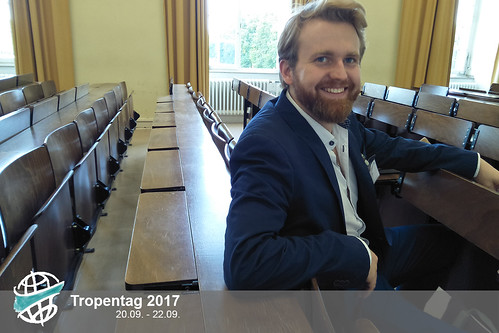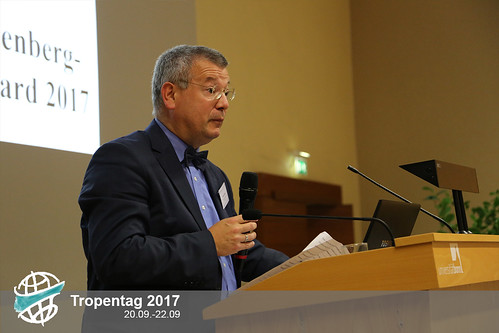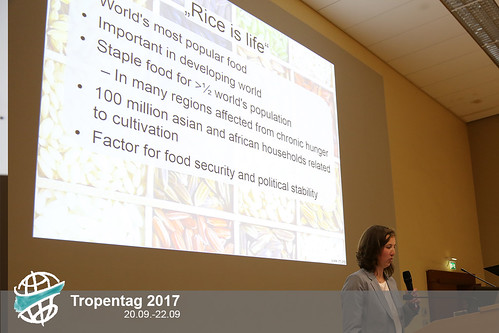People 2017
Vétérinaires Sans Frontières (Germany)
Wed, 09/27/2017 - 12:00 — TTVétérinaires Sans Frontières is an NGO that operates in East Africa. They support pastoral communities through various projects, such as training animal health workers, who travel through local communities helping to both detect common diseases, and vaccinate against them. Another example is improving food hygiene, by providing aluminum cans to store milk. For more, go to their website
The Green Talents Award
Mon, 09/25/2017 - 18:33 — TTThe German Federal Ministry of Education and Research (BMBF) hosts the prestigious ”Green Talents – International Forum for High Potentials in Sustainable Development” to promote the international exchange of innovative green ideas. The winners come from numerous countries and scientific disciplines and are recognised for their outstanding achievements in making our societies more sustainable.
According to project coordinator Julia Kirschner, winning the Green Talents Award means you are invited with the other 24 recipients to Germany to attend the Green Talents Science Forum. You do not only get a chance to travel around Germany, but the chance to visit three experts of your choice. A year later you can arrange to have a research stay for three months at the institution of your choice.
A recipient of the award in 2016, Hèou Maléki Badjana from Togo shares his thoughts and experiences in the video below.
If you are interested in the Green Talents Competition 2018 please register for their Competition Alert and you will be informed as soon as the next submission period starts.
.Dinner is Served...the Desert Locust!
Thu, 09/21/2017 - 18:06 — lizkusiaPhillip Straub, a first-time participant at Tropentag has developed a diet for the desert locust. The outstanding young German researcher submitted an abstract from his Bachelor’s degree thesis. He was overwhelmed after hearing he was selected for an oral presentation. To say the least, he was very excited. Philip is convinced that insects for food is the next big thing. “There are new developments every day, it is exciting,” he said. Philip won a GIZ scholarship to carry out his research project at the International Centre of Insect Physiology and Ecology (ICIPE), Kenya.

He sought to develop a storable diet for the desert locust that could be used for mass rearing. The desert locust is consumed by humans and can also be used as an animal feed supplement. He tested five different formulations for human food. They mainly consisted of powdered cowpea, cornmeal, soy bean and carrots in different ratios. Some were enriched with multivitamins. Two diets worked well. “My findings are a starting point for optimizing diets with a longer shelf-life for insects,” he explains.
Young Scientists Win Award for Fight Against Hunger
Wed, 09/20/2017 - 19:53 — giulia.rotanodari “Genome based identification of heterotic pattern in rice”, Ulrike Beukert, University of Martin-Luther-University of Halle-Wittenberg
“Genome based identification of heterotic pattern in rice”, Ulrike Beukert, University of Martin-Luther-University of Halle-Wittenberg
Rice is one of the most important staple crops in the world. A lot of research has been conducted, but more investigations are needed in order to optimize land use by maximizing yield. Ulrike Beukert, a MSc. student at the University of Martin-Luther-University of Halle-Wittenberg, conducted an investigation on boosting yield by exploiting heterosis in rice. Results show that heterosis provides enhanced yield stability and increased abiotic and biotic stress resistance.
Hans H. Ruthenberg Award for Graduates
Wed, 09/20/2017 - 18:47 — TTThe Hans Hartwig Ruthenberg Graduate Award is given to the promising young scientist who work for improving the farming system and constantly fight for hunger. This year Ulrike and Sarah were honored.

Ulrike Beukert
How will we feed the growing population and high demand of rice in the future? For a long time, plant breeding has been popular answer to this question. However, flat results and high use of resources is a growing challenge. Ulrike Beukert, Plant Breeding student from Martin-Luther-University of Halle-Wittenberg has a new approach to rice breeding. Her research on “Genome-based identification of heterotic patterns in rice,” used only small selection of hybrid to predict the entire parent-line. Applying bio-statistic analysis of yield and gene marker data, she can increase the prediction accuracy and improve yield.
Mathias Becker; Organizing Tropentag is routine for me
Wed, 09/20/2017 - 09:45 — pia.fehleWe interviewed Professor Mathias Becker from the University of Bonn. He is organizing this year’s conference. Learn more about his experiences and expectations in this video




